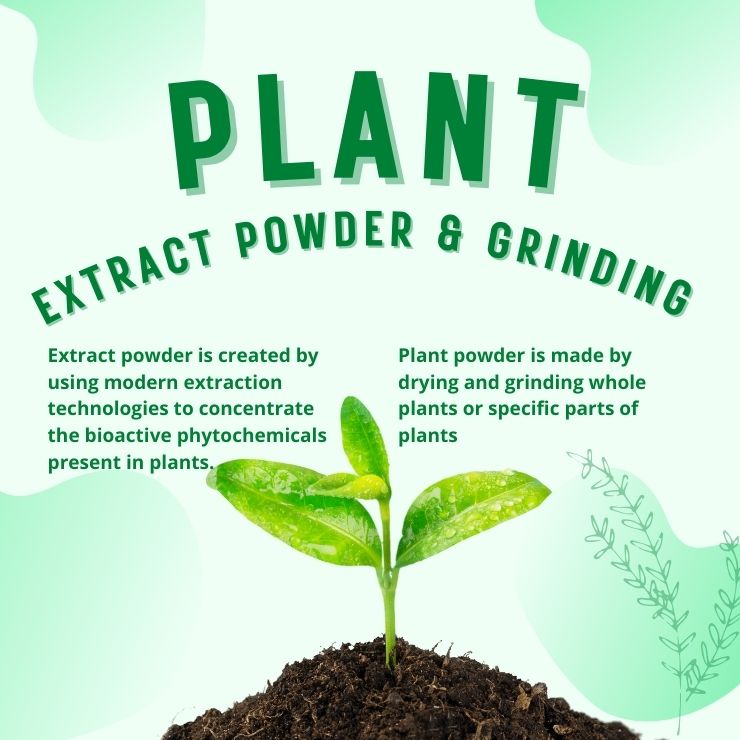What is the difference between plant extract powder and plant powder
Plant extract powder and plant powder are two different forms of plant-based products, each with distinct characteristics and uses:
Plant Extract Powder:
- Production Process: Extract powder is created by using modern extraction technologies to concentrate the bioactive phytochemicals present in plants. Solvents, such as ethanol and water, are often used to separate soluble plant metabolites from the insoluble cellular marc.
- Composition: Extract powders contain a high concentration of specific active compounds extracted from the plant, which are usually the bioactive and therapeutic constituents. These compounds can vary based on the plant and its intended use.
- Solubility: Extract powders typically have good water solubility, making them suitable for use in various liquid formulations, capsules, tablets, and other health products.
- Safety: Extract powders are generally considered safe for consumption since the solvents used in the extraction process are removed, leaving behind the concentrated active ingredients.
- Common Processing Methods: Extraction methods for creating extract powders include vacuum and spray drying.
Plant Powder:
- Production Process: Plant powder is made by drying and grinding whole plants or specific parts of plants, such as leaves, roots, or seeds. The grinding process doesn’t alter the structure of the active ingredients significantly.
- Composition: Plant powders contain the entire plant or parts of it, including both active and inactive compounds. They may also retain relatively high levels of substances like heavy metals and pesticide residues compared to extracts.
- Solubility: Plant powders are often insoluble or poorly soluble in water due to their coarse texture and the presence of various plant components.
- Uses: Plant powders are used in various applications, such as culinary uses, herbal remedies, and cosmetics. They are less concentrated than extracts and may have different effects on the body.
- Particle Size: Plant powders typically have a coarser texture compared to extract powders.
Key Differences:
- Extract powders are highly concentrated and contain specific active compounds extracted from plants, while plant powders contain the whole or parts of the plant with both active and inactive components.
- Extract powders have better water solubility, making them suitable for various formulations, while plant powders are often insoluble or poorly soluble in water.
- Extract powders are generally considered safe for consumption after the removal of solvents, while plant powders may retain higher levels of impurities like heavy metals and pesticides.
- The choice between extract powder and plant powder depends on the intended use and the desired concentration of active compounds.
When using plant-based products, it’s important to understand the differences between these forms and choose the one that best suits your specific needs and applications.
Making the Choice
The choice between plant extracts and plant powders depends on your specific needs and goals. If you’re aiming for a highly concentrated product with specific therapeutic effects, plant extracts may be the way to go. On the other hand, if you want to embrace the full spectrum of a plant’s benefits and are less concerned with water solubility, plant powders could be a suitable choice.
Ultimately, your decision should align with your product’s intended use and your target audience’s preferences. Whether you opt for the potency of plant extracts or the wholeness of plant powders, understanding these differences is essential for creating herbal products that deliver on their promises.

Comments
Post a Comment